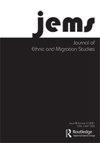黑人的符号学:中国移民社区的种族、日常语言和话语复杂性
IF 2.8
1区 社会学
Q1 DEMOGRAPHY
引用次数: 0
摘要
在坦桑尼亚的中国移民中,“黑人”是一个无所不在的词语,有许多指称,囊括了从劳工到国家官员的所有人,从一个民族-种族类别到一个个人代词。在英文翻译中,这个词与中非关系中的种族化有关。在本文中,基于对坦桑尼亚中国移民长达17个月的田野调查,我研究了日常话语中的种族化,以及(白人)民族志报告文学中(非白人)种族主义的政治。我关注的是中国人的社会生活中的“继承人”这个词,研究它是如何在异质的社会情境和话语语境中被部署的。我认为,“Heiren”一词的使用使坦桑尼亚人的不同经历和对坦桑尼亚人的态度趋于平面化,有助于构建非洲他者。具体来说,中国移民在经济上享有特权,但在政治上处于弱势地位,他们谈论与坦桑尼亚人的紧张关系,就变成了一种方式。然而,我认为黑人谈话的意义并不在于它将孤立的“中国人”定义为“种族主义者”,而是它如何在话语上与全球反黑人沆瀣一气。本文章由计算机程序翻译,如有差异,请以英文原文为准。
The semiotics of Heiren (黑人): race, everyday language, and discursive complicities in a Chinese migrant community
ABSTRACT Among Chinese migrants in Tanzania, “Heiren (黑人)” (black person/people) is a ubiquitous term with many referents, encapsulating everyone from labourers to state officials, and ranging from an ethno-racial category to an individual pronoun. In English translation, the term bears on a contentious debate regarding racialisation in Africa-China relations. In this paper, based on seventeen months of fieldwork among Chinese migrants in Tanzania, I examine racialisation in everyday discourse, and also the politics of (white) ethnographic reportage on (non-white) racism. I focus on the social lives of the word heiren among Chinese, examining how it is deployed in heterogenous social situations and discursive contexts. I argue that the use of ‘Heiren’ flattens otherwise heterogeneous experiences with and attitudes towards Tanzanians, contributing to the construction of an African other. Specifically, talking about Heiren becomes a way that economically privileged but politically vulnerable Chinese migrants talk about the tense relations they have with Tanzanians. However, I argue the significance of Heiren talk is not that it defines ‘the Chinese’ in isolation as ‘racist’, but rather how it becomes discursively complicit with global anti-blackness.
求助全文
通过发布文献求助,成功后即可免费获取论文全文。
去求助
来源期刊

Journal of Ethnic and Migration Studies
Multiple-
CiteScore
7.80
自引率
9.10%
发文量
157
期刊介绍:
The Journal of Ethnic and Migration Studies (JEMS) publishes the results of first-class research on all forms of migration and its consequences, together with articles on ethnic conflict, discrimination, racism, nationalism, citizenship and policies of integration. Contributions to the journal, which are all fully refereed, are especially welcome when they are the result of original empirical research that makes a clear contribution to the field of migration JEMS has a long-standing interest in informed policy debate and contributions are welcomed which seek to develop the implications of research for policy innovation, or which evaluate the results of previous initiatives. The journal is also interested in publishing the results of theoretical work.
 求助内容:
求助内容: 应助结果提醒方式:
应助结果提醒方式:


